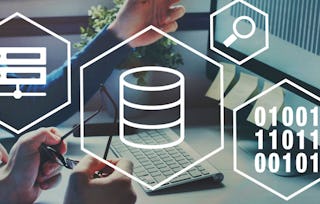This is the first of four courses in the Google Business Intelligence Certificate, which will help develop the skills needed to apply for entry-level roles as a business intelligence (BI) professional. People who work in BI help organizations access the right data, use data to help businesses grow and improve, and put insights into action. In this course, you’ll discover the role of BI professionals within an organization and explore BI tools you can use on the job.

Foundations of Business Intelligence

Foundations of Business Intelligence
This course is part of Google Business Intelligence Professional Certificate

Instructor: Google Career Certificates
186,554 already enrolled
Included with
(2,111 reviews)
What you'll learn
Understand common careers and industries that use BI
Investigate the impact data can have on business decision-making
Explain the important role that BI professionals have in businesses
Develop a BI project plan
Skills you'll gain
- Data Storytelling
- Business Process
- Stakeholder Communications
- Data-Driven Decision-Making
- Data Pipelines
- Project Implementation
- Data Integration
- Key Performance Indicators (KPIs)
- Stakeholder Engagement
- Project Design
- Data Modeling
- Business Analytics
- Business Process Improvement
- Real Time Data
- Data Analysis
- Dashboard
- Business Intelligence
Details to know

Add to your LinkedIn profile
See how employees at top companies are mastering in-demand skills

Build your Data Analysis expertise
- Learn new concepts from industry experts
- Gain a foundational understanding of a subject or tool
- Develop job-relevant skills with hands-on projects
- Earn a shareable career certificate from Google

There are 4 modules in this course
Begin learning about business intelligence and the roles of BI analysts and engineers within organizations. You’ll discover the tools and techniques BI professionals use to make business decisions and improve processes. In addition, you’ll explore the similarities and differences between BI and data analytics.
What's included
16 videos15 readings7 assignments4 plugins
Explore the BI process, which involves engaging with stakeholders, using tools to make the most of available data, and applying the power of rapid monitoring to make smart business decisions. In addition, you’ll start building career resources by enhancing your online presence, developing strategies for networking and mentorship, and creating a portfolio that will impress future hiring managers.
What's included
11 videos5 readings3 assignments1 plugin
Consider the importance of context from a BI perspective. You’ll explore data limitations, including how to address constant changes and access big-picture insights in a timely manner. You’ll also discover strategies that BI professionals use to anticipate and overcome these limitations. Finally, you’ll develop an understanding of how context influences metrics.
What's included
7 videos9 readings3 assignments1 plugin
Finally, you’ll complete an end-of-course project. The project is an opportunity to apply the skills and knowledge you developed during this course in a workplace scenario. For this project, you’ll prepare project planning documents and solve a business problem using BI.
What's included
5 videos11 readings3 assignments
Earn a career certificate
Add this credential to your LinkedIn profile, resume, or CV. Share it on social media and in your performance review.
Instructor

Offered by
Explore more from Data Analysis
 Status: Free Trial
Status: Free Trial Status: Free Trial
Status: Free Trial Status: Free Trial
Status: Free Trial Status: Free Trial
Status: Free Trial
Why people choose Coursera for their career

Felipe M.

Jennifer J.

Larry W.

Chaitanya A.
Learner reviews
- 5 stars
82.78%
- 4 stars
13.85%
- 3 stars
2.08%
- 2 stars
0.61%
- 1 star
0.66%
Showing 3 of 2111
Reviewed on Feb 14, 2025
Very foundational, does a great job recapping key concepts, however, it is very repetitive for someone who already works in the field
Reviewed on Jun 9, 2023
This is a basic course for business intelligence, it covers all the relevant knowledge to keep the business growing in right direction!
Reviewed on Jun 19, 2024
It was very educative. The hands on projects and the teachings really does justice and I really enjoyed the whole course program

Open new doors with Coursera Plus
Unlimited access to 10,000+ world-class courses, hands-on projects, and job-ready certificate programs - all included in your subscription
Advance your career with an online degree
Earn a degree from world-class universities - 100% online
Join over 3,400 global companies that choose Coursera for Business
Upskill your employees to excel in the digital economy
Frequently asked questions
Organizations of all types and sizes have business processes that generate massive volumes of data. Information is constantly created by computers, the internet, phones, texts, streaming video, photographs, sensors, and more. In the global digital landscape, data is increasingly imprecise, chaotic, and unstructured. As the speed and variety of data increase exponentially, organizations are struggling to keep pace.
Business intelligence is the work involved in gathering, structuring, interpreting, monitoring, and reporting this data in accessible formats that enable stakeholders to understand and use it effectively. Organizations rely on this information to make better strategic and operational business decisions. As a result, there is high demand in the marketplace for business intelligence professionals with the skills and expertise to achieve these goals.
Business intelligence professionals are critical to many organizations today. They use data to help solve business problems, performing a variety of tasks that enable decision makers to understand and use data effectively. Some common responsibilities of BI professionals include gathering project requirements from stakeholders, retrieving and organizing large datasets, and creating visualizations and dashboards to report insights to others. Organizations use the intelligence they share to make decisions, develop new processes, create business strategies, and conduct deeper analyses.
As businesses generate more and more data, there is increased demand for BI professionals to transform this data into meaningful business insights. BI skills are transferable to jobs across multiple industries, including financial services, education, healthcare, and manufacturing. The Google Business Intelligence Certificate will help you prepare for a job in the BI field.
More questions
Financial aid available,
¹ Some assignments in this course are AI-graded. For these assignments, your data will be used in accordance with Coursera's Privacy Notice.

